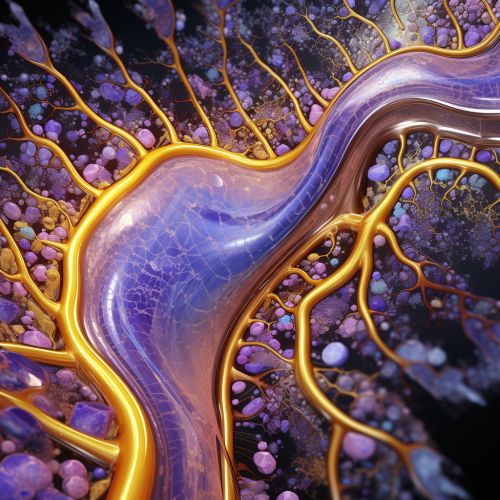Pancreatic cancer
Overview
Pancreatic cancer is a type of malignancy that originates in the pancreas, an organ located in the abdomen behind the stomach. This type of cancer is characterized by the uncontrolled growth of cells in the pancreas, leading to the formation of a tumor. Pancreatic cancer is one of the deadliest forms of cancer due to its typically late diagnosis and aggressive nature.


Classification
Pancreatic cancer can be classified into two main types: exocrine and endocrine cancers. Exocrine pancreatic cancer is the most common type and it originates from the exocrine cells that produce digestive enzymes. The most common subtype of exocrine pancreatic cancer is adenocarcinoma, which accounts for about 95% of cases. On the other hand, endocrine pancreatic cancer, also known as pancreatic neuroendocrine tumors (PNETs), is much less common and arises from the endocrine cells that produce hormones.
Risk Factors
Several risk factors are associated with an increased likelihood of developing pancreatic cancer. These include smoking, obesity, a family history of pancreatic cancer or certain genetic syndromes, chronic pancreatitis, diabetes, and certain dietary factors. It is important to note that having one or more risk factors does not guarantee that an individual will develop pancreatic cancer, but it does increase the likelihood.
Symptoms
The symptoms of pancreatic cancer often do not appear until the disease has advanced, which contributes to the high mortality rate associated with this type of cancer. Common symptoms include abdominal or back pain, unexplained weight loss, jaundice, loss of appetite, nausea, and changes in stool. In some cases, new-onset diabetes may be a symptom of pancreatic cancer.
Diagnosis
The diagnosis of pancreatic cancer typically involves a combination of imaging tests, such as computed tomography (CT) scan, magnetic resonance imaging (MRI), and endoscopic ultrasound. In some cases, a biopsy may be needed to confirm the diagnosis. Blood tests, including tumor marker tests, may also be used in the diagnostic process.
Treatment
The treatment of pancreatic cancer depends on the stage of the disease, the patient's overall health, and their personal preferences. Treatment options may include surgery, radiation therapy, chemotherapy, targeted therapy, and immunotherapy. In some cases, a combination of these treatments may be used. Palliative care is also an important aspect of treatment for patients with advanced pancreatic cancer.
Prognosis
The prognosis for pancreatic cancer is generally poor, with a 5-year survival rate of about 10% for all stages combined. However, the survival rate can vary depending on the stage of the disease at diagnosis and the patient's overall health. Early detection and treatment can significantly improve the prognosis.
Prevention
While it is not possible to completely prevent pancreatic cancer, certain lifestyle modifications can reduce the risk. These include quitting smoking, maintaining a healthy weight, eating a balanced diet, and regular physical activity. Regular check-ups are also important, especially for individuals with a high risk of developing pancreatic cancer.
